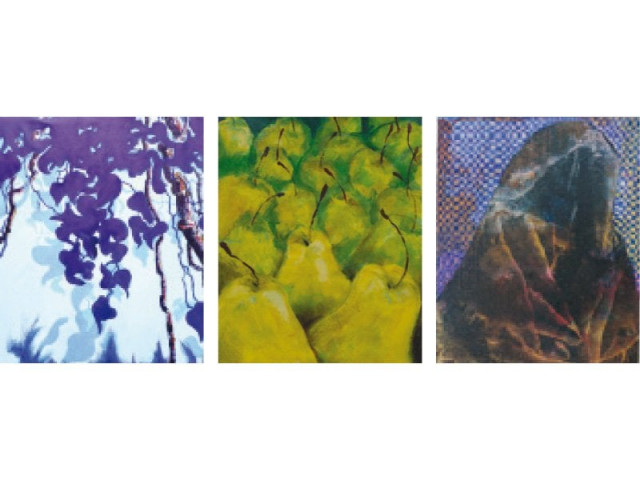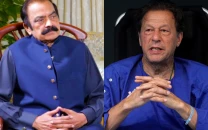Baloch and Bellon overcome distances for an exhibition you can’t ‘overlook’
Artists from Quetta and France paint what is most common in their societies.

Bertrand Bellon from France depicted shadows of trees on walls in colours that he perceived as warm and quiet (left). He also tried to reshape common objects, such as fruits, in his works (middle). Akram Dost Baloch was inspired by ordinary people on the streets and their struggle for survival (right). The two artists also painted each other’s portraits (below). PHOTOS COURTESY: ARTISTS
The two artists share 12 years of friendship that is spread over several combined exhibitions in Karachi and Paris. Baloch, who is currently the chairperson of the University of Balochistan’s fine arts department, and Bellon, who is also a professor, are displaying their current works at Alliance Française de Karachi in at exhibition titled ‘Overlooked: Quetta - Paris painted dialogue (II)’, curated by Bellon’s son Luc Bellon.
At first glance, Baloch’s dark portraits and Bellon’s bright-coloured fruits and the different shades of blue shadows stand in stark contrast. Bellon explains, however, that they both have portrayed the realities of their respective societies.
The series includes several paintings depicting shadows of trees that fall on the walls. While most of the shadows have light as a basic background, the one with the window as a source of light, stands out the most. Bellon says this is the reality as he interprets it. “We do not have the capacity to know what is right or wrong, all we see are shadows of the real world.” It is with our minds that we deduce what the world must be like, he said.
On the side of the hall are paintings of fruits, something Bellon feels is “extremely simple and extremely complex at the same time”. Bellon uses complementary colours - yellow with purple, green with blue - reflecting various emotions since each painting is an individual work. In contrast, the series on shadows resulted from just one emotion.
When Baloch tries to show the reality of his society, out comes dark images of women behind veils, men with heavy moustaches, and children wrapped in their mothers’ arms. Before explaining his portraits, Baloch clarifies that the concept of ‘beautification’ holds no meaning for him. Living in Pakistan, especially in Quetta, we are always in a state of mental torture. Even the need to show our IDs at the gates of Alliance Française is a mental disturbance because it is our own city and we shouldn’t be asked to declare our identities, he said.
He attempts to show this disturbance by capturing the images of ordinary people, with the missing elements signifying all that is lagging. Baloch criticised those who hide under the label of ‘liberalism’ and use that as an excuse to shed any responsibility they have towards society. “The word ‘liberalism’ is a curse to me.”
Baloch kept the background of his pictures vague on purpose because he wanted to focus on the subjects alone. Against a zigzag backdrop, he painted a woman wrapped in a shawl with no visible features. “That is how women, the most important component of our society, are seen - hidden behind shadows.”
He understands that his paintings may not be able to create a mass appeal. “So what if these paintings don’t match the furniture of a house in Defence?” he shrugs. “I need to show where a common man stands.” Baloch has displayed his works in Paris, as well. “The people of Paris appreciate art for its content, while the people here only appreciate art if it comes with a famous brand name, such as Sadequain or Gulgee.” The exhibition runs till February 3 at Alliance Française.
Published in The Express Tribune, January 31st, 2013.



















COMMENTS
Comments are moderated and generally will be posted if they are on-topic and not abusive.
For more information, please see our Comments FAQ